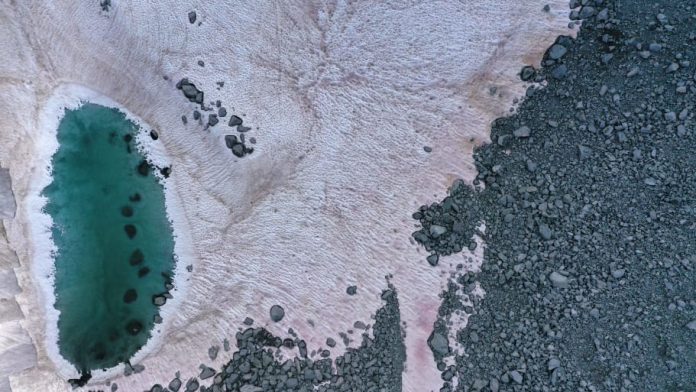The mysterious appearance of pink snow in the Italian Alps has sparked concerns over accelerated melting in the European mountain range.
Scientists are investigating the phenomenon, which might be caused by algae usually observed in Greenland, after the discoloured snow appeared on the Presena Glacia, around 30 miles from the city of Trento.
Biagio Di Mauro of Italy’s National Research Council said the algae, called Ancylonema nordenskioeldii, was the likely culprit, and that he had previously studied it on a glacier in Switzerland.
“The alga is not dangerous, it is a natural phenomenon that occurs during the spring and summer periods in the middle latitudes but also at the poles,” he told news service Science X.
Because ice is white, it reflects most of the sun’s energy, but darker algae means more of that heat is absorbed, both melting the ice and warming the climate.
A warmer climate and melting ice then improves conditions for the algae, which has more ready access to water and oxygen.
“Everything that darkens the snow causes it to melt because it accelerates the absorption of radiation,” Dr Di Mauro said.
“We are trying to quantify the effect of other phenomena besides the human one on the overheating of the Earth.”
The Antarctic has seen similar issues in 2020, with both “blood red” and “green” snow triggered by algae plaguing regions of the world’s southernmost continent.
In February, researchers released images of the red snow at Vernadsky Research Base, while scientists from Cambridge University in May revealed vast areas of green snow near a penguin colony.
A 2018 United Nations report found the planet was on track to reach 1.5C between 2030 and 2052 if temperatures continues to increase at the current rate, and 3C by the end of the century.
Once we hit 2C warming, the world will be a profoundly different place. There will be almost no coral reef remaining, the Arctic will be completely devoid of ice during summer at least once a decade, and huge numbers of animals and plants will become extinct as their habitat becomes smaller and smaller.





























